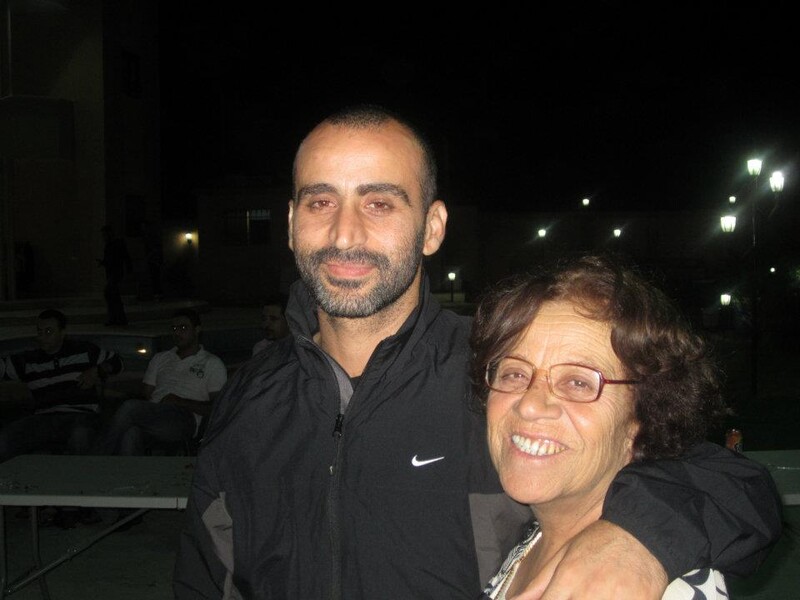25 April 2012

People celebrate Loai Odeh’s freedom in October 18 and welcome him in Gaza
Loai Odeh is a former prisoner and my best friend, whom I am very proud to have met after his release. He joined the campaign of disobedience, the 22-day mass hunger strike, launched at the end of September 2011 to protest cruel conditions and an escalating series of punitive measures against Palestinian prisoners, until the swap deal by Israel and Hamas on 18 October.
He was released after 10 years of imprisonment and expelled from Jerusalem, in the occupied West Bank, to Gaza, where we met at a festival. Since his release, his main concern has been the prisoners he left behind. He always attends events in solidarity with them. He has been my main resource every time I had a question or needed to enrich my knowledge about prisoners’ conditions.
While following his updates on Facebook, I noticed that he had written new “status” updates taking the form of a hunger striker’s diary recalling his experience. This surprised me, as he had seldom posted on Facebook since opening his account. His diaries are touching and vivid, giving a clear vision of the great challenge and determination of our prisoners despite the brutal repression of the Israeli Prison Service.
The following is my translation of Loai’s diaries, describing the first eight days of a hunger strike:
On 17 April, Loai wrote:
Today is the first day of the battle to defend our dignity. The battle’s leaders are our homeland’s heroes who are resisting with their empty stomachs for the sake of our dignity.
The first day of a hunger strike is the hardest. Abstaining from food or drinks has a great impact on strikers during the first three days. But what distinguishes the first day is the measures that the Israeli Prison Service (IPS) takes against our prisoners, attempting to repress them. The jailers confiscate all their possessions, but are generous enough to leave them only the clothes they’re wearing. Moreover, they remove everything the cells contain in a very provocative way, damaging a lot of valuable items our prisoners have collected throughout their precious years in jail to ease the pain of their daily lives. On top of that, IPS conducts misinformation campaigns between cells and prisons, so that no one knows whether he will be separated from his circle of friends and the environment to which he has adapted.
The journey of steadfastness and determination begins when the strikers manage to control themselves and overcome their desires and physical needs, armed with their desperate desire for freedom and victory which will bring them dignified lives.
We are all with you, as you’re our conscience.
On 18 April, Loai wrote:
Today is the second day of the journey of respect and pride. Today is one of the hardest days of hunger strike as the body still isn’t used to not receiving its necessities from food and drinks, especially coffee. This causes lasting headaches. The pain of hunger is also at its peak.
The biggest challenge is for the smokers among our prisoners. For them, quitting cigarettes is more difficult than abstaining from food. It makes them lose their temper. But this condition simply vanishes once their will reminds them of their goal of defeating the jailers. Therefore, during these days, there is no place for irritation despite the constant harassment our prisoners endure at the jailers’ hands. Our prisoners prefer to not waste their energy responding to the provocation of the IPS. Before the strike starts, all prisoners agree that strikers shouldn’t respond to any of the harassment and provocation they face, and that they shouldn’t exert any effort, to spare their energy for the days ahead. This battle is different from other clashes that happen on normal days between jailers and detainees. When there is no hunger strike, it is not allowed for any detainee to accept insults, and if one is humiliated by a jailer and doesn’t assert his rights immediately, he faces punishment by the national committee inside the prisons.
The strong will that our friends behind bars enjoy turns all their sufferings into fuel that lights their flame of victory. Their faith in the just cause they have fought for makes them solid rocks that shatter the fascism of IPS.
On 19 April, Loai wrote:
The battle of the empty stomachs still continues. It is the third day of the strike. The hardest stage ends here as the body starts using the muscles’ reserves of food to produce energy. It stops sending signs and pains of hunger. Here, strikers feel that things are getting better, not realizing that they have begun losing around 1 kg of weight per day. Actually, by now, it has become harder for them to move.
According to law, strikers have the right to stop standing for the daily counting procedure starting from the third day, as standing causes them dizziness, and sometimes unconsciousness. Though Israel’s oppressive administration, compelled by law, exempts them from standing for counting, they overstrain our prisoners with endless searches and announcements, which are very exhausting.
Despite everything, our heroes become more steadfast as a result of these attempts to enslave them. The more inhumane treatment they endure, the more strength and resistance they display.
As the living martyrs are the leading defenders for our dignity, we will always remain loyal to their just cause.
On 20 April, Loai wrote:
Today is the fourth day of challenge and championship. Today, silence begins to spread all over. By now, the striker tends to be silent and stops talking. All the voices around him seem loud. He becomes unable to join discussions. As days pass, his ability to hear voices shrinks, expect for these which lift the spirit up and strengthen souls and hearts. These voices are mainly the ones that bring news about popular support for their battle. This news becomes the source of energy, the strongest motivation for them to remain steadfast.
Our enemy is fully aware of that. The Israel jailers treat our heroes in a brutal manner. They set up speakers and raise the volume to its loudest, constantly playing Hebrew music and news that will depress their spirits. They also circulate special news about them, like claims about the declining number of hunger strikers and names of those who have broken their fasts. They also do their best to give hunger strikers the impression that life outside is moving on normally and no one there cares about them.
However, all these inhumane attempts fail once a prisoner returns from a visit with his lawyer to tell them about popular events held locally and internationally to support them and their just cause. So don’t ever underestimate any activity you do, as they have small, smuggled radios with which they follow the news. Even children’s protests increase their inner determination to achieve their aims, as they feel that their responsibilities have broadened to include children, the future generation, which have spiritually joined their battle.
We have faith in your ability to win and we are with you until victory!

Loai Odeh and his childhood friend Bilal Odeh whom he sadly left behind. This photo was taken in prison.
On 21 April, Loai wrote:
Today is the fifth of the days of challenge. The battle of steadfastness goes on. What makes it more powerful is the strength of their leaders, which has a strong impact on the strikers’ spirit. The news which informs the strikers that their heroic leaders have joined the hunger strike fills them with unspeakable and incomparable energy. Ahmad Saadat has bravely joined their battle, despite his critical medical condition after participating in the previous, exhausting mass hunger strike, which lasted for 24 days. Receiving such news gives morale support to strikers, strengthening their determination even more.
We will unite soon as you win the battle.
On 22 April, Loai wrote:
Today is the sixth day of the battle of championship, the hunger strike for the sake of dignity and freedom. Today, the strikers’ stomachs start to get used to hunger. Strikers make sure they lick some salt several times during the day to avoid the putrefaction of their stomachs. This annoys the tyrannical Israeli prison administration to the extent that they sometimes confiscate even the salt prisoners keep to survive their battle. However, our prisoners hide small quantities of salt in the cracks of walls or under their mattresses.
But IPS is very generous with the fascist practices they rain on our heroes. They pump water into their mattresses and walls so the salt melts. How can they accept our heroes finishing their strike without any permanent damage? Most of our prisoners who joined long hunger strikes have sustained ulcers and gastritis (inflammation of the stomach lining) as a result.
But our prisoners have smart ways of hiding salt, small radios, and everything that helps them to survive and persist. Even if IPS stripped them of everything they own, it will never manage to break their will. Their indestructible spirit will lead them to victory, as they are starving for the sake of dignity.
Your steadfastness brings us honor!
On 23 April, Loai wrote:
Today is the seventh day of the mass hunger strike. Strikers’ bodies get more accustomed to hunger than during the first days of striking. However, joint pains start and a feeling of coldness pervades their bodies and increases as more days of hunger pass. Their stomachs adjust to the lack of food and stop producing the juice needed for digestion as there is no food to be digested in the first place. This avoids the negative side effects of this juice on their stomachs and helps the feeling of hunger to stop.
However, the fascist Zionist guards keep up their outrageous actions aimed at tempting the strikers into breaking their fast. Inhumanely, they bring cooking equipment in front of strikers’ cells and start frying and grilling food such as eggplants that arouses their empty stomachs to produce the digestive fluids. As a result, the hunger pangs begin anew, and having nothing for that juice to digest causes sores which accompanies strikers for many years after the hunger strike.
These fascist procedures makes our heroes more determined to defeat the IPS with their empty stomachs.
With this battle of empty stomachs, you bring us honor. We trust in your ability to win.

Loai Odeh and his mother reunite in Gaza after his release.
On 24 April, Loai wrote:
Today is the eighth day of the battle. In the eighth day of the hunger strike, the strikers’ movements start to decrease notably as the joint pain and the dizziness which result from moving prevents them from doing so. These consequences leave them stretched on their mattresses motionless, dreaming about the day the hunger strike ends with victory.
During these difficult times, our prisoners try their best to stop thinking about their families but all attempts fail. Instead, their families constantly dominate their thoughts, especially their mothers. Mothers become their central concern as strikers realize that their mothers bear more pain than they themselves do. Despite the fact that our heroes think of their mothers more than themselves, they keep looking forward to a breaking dawn when their strike will end with a satisfactory victory that befits them, a victory that makes them proud. All respect for the mother that gave birth to and raised these heroes. Palestinian mothers are the source and root of revolution and never complain.
It’s our duty to tenderly embrace our prisoners’ mothers with all possible care till we celebrate the victory and the freedom of their sons.





